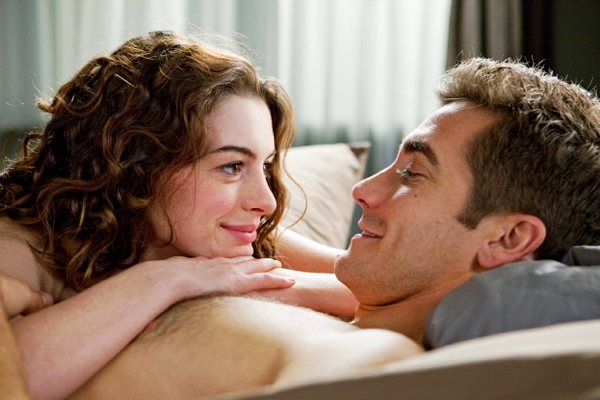Movie review by Greg Carlson
Loosely based on Jamie Reidy’s memoir “Hard Sell: The Evolution of a Viagra Salesman,” Edward Zwick’s relationship comedy/drama “Love and Other Drugs” comes with a lengthy list of harmful side effects. Jake Gyllenhaal and Anne Hathaway, both as gorgeous as ever, use their substantial charms to paper over blemishes in the screenplay, which lurches from syrupy, commitment issue-oriented melodrama to faint satire criticizing the practices of pharmaceutical giants like onscreen employer Pfizer. The sexual chemistry of the lead performers and Zwick’s brisk pacing cannot fully compensate for the genre’s pro forma expectations, and the movie eagerly embraces too many of the clichés that attend the boy-meets-girl blueprint.
One minute sees a rapid-fire exchange of tables-turning banter upending gender expectations of voracious sexual appetites while the next minute wallows in socially awkward “caught in the act” masturbation slapstick. Also bobbing along is the vague impression that Zwick would like to use the 1990s period setting, built around the astronomic sales success of the so-called “Vitamin V” as it morphed from butt of late-night Bob Dole jokes on Conan to billion-dollar cash cow, as a Capra-corny “Up in the Air” parable about the tension between soulless monetary gain and human connection and romantic vulnerability.
Despite its frayed premise, the filmmakers work diligently to sidestep some of the pitfalls of healthy-person-falls-for-ailing-person tearjerkers like “Love Story,” “Dying Young,” and “A Walk to Remember.” Hathaway’s Maggie, a collage artist with an astonishing knowledge of prescription medications, is afflicted with early Parkinson’s disease, and her frank disclosures and self-deprecating wit take precedence over moments that depict the gradual degeneration of her central nervous system. Maggie’s bracing intelligence and verbal dexterity challenge Gyllenhaal’s eager-to-please Jamie, a smooth operator used to getting everything he wants.
Almost a quarter century ago, Zwick directed the adaptation of David Mamet’s “Sexual Perversity in Chicago.” “About Last Night…” which starred Demi Moore and Rob Lowe, shares much in common with “Love and Other Drugs,” perhaps most obviously a sense of erotic electricity. More fuss than necessary has been made of the nudity in “Love and Other Drugs,” and Hathaway offered her thoughts on the matter during a recent edition of “Fresh Air” in conversation with Terry Gross. While Gross hinted that she was taken aback by Hathaway’s nakedness, film critic Stephanie Zacharek spent nearly half of her “Movieline” review backing up the performer and discussing the risks of being taken seriously when appearing au naturel.
True to the narrow confines of its genre, the supporting characters are presented mostly as broad stereotypes. Hank Azaria’s horny physician, Oliver Platt’s burned out company man, and Gabriel Macht’s physically aggressive foil exhibit little resemblance to actual human beings. Worst of all is Jamie’s slovenly brother Josh (Josh Gad, uncharitably described by Eric Hynes as “a poor man’s Jonah Hill”), a newly minted millionaire who crashes on his older brother’s couch as a grating reminder of the adolescent irresponsibility Jamie has begun to jettison as he falls in love with Maggie. While Josh turns up in scene after scene to yammer supportively to his sibling, Maggie – like so many of her cinematic counterparts – never interacts with a close female friend, reminding viewers that “Love and Other Drugs” is far more respectful in its treatment of Parkinson’s disease than in its depictions of women.
